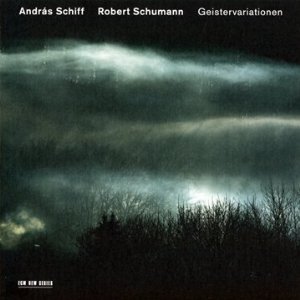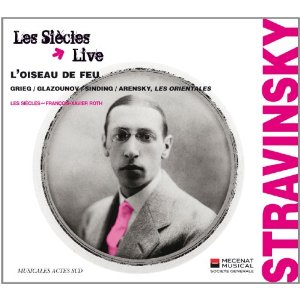Classical CDs Weekly: Schumann, Stravinsky, Xenakis | reviews, news & interviews
Classical CDs Weekly: Schumann, Stravinsky, Xenakis
Classical CDs Weekly: Schumann, Stravinsky, Xenakis
Romantic piano music, bone-crunching Greek Modernism and an unusual recording of a famous ballet
 Schumann: Geistervariationen András Schiff (ECM)
Schumann: Geistervariationen András Schiff (ECM)
Hungarian pianist András Schiff has been revisiting some of the core repertoire with which he first made his name. This ECM two-disc set offers a revelatory Schumann recital – this label’s typically dour cover art giving little hint of the vibrancy and colour of Schiff’s playing. Papillons and the Kinderszenen are both performed with unshowy sincerity – Schiff’s lightness of touch in the miniatures which make up Papillons is a delight, and Kinderszenen never sounds clichéd – this is the sweetest, sincerest Träumerai I’ve heard. Schiff also gives us the nine Waldszenen – Vogel als Prophet has a probing, improvisatory feel, and the Jagdlied has bounce and swagger.
The disc takes its name from the 1854 Geistervariationen, their theme supposedly dictated to an ailing Schumann by angels. That the melody itself is so unshowy, so simple comes as a slight disappointment, and after the bravura of the earlier works it’s startling to hear how subdued and subtle Schumann’s five short variations are. The big attraction of the set is the C major Fantasy, a sonata in all but name. In 1975, Schiff managed to track down a copy of the work’s original ending, languishing in a Budapest library. Here, the Beethoven quotation used in the work’s first movement is recalled in the closing minutes. It works beautifully, and Schiff also gives us Schumann’s original close as a comparison. There’s also a powerful account of the F-sharp minor sonata. Astonishing playing, stunningly recorded and very well annotated.
 Stravinsky: The Firebird Les Siècles/François-Xavier Roth (Les Siècles Live)
Stravinsky: The Firebird Les Siècles/François-Xavier Roth (Les Siècles Live)
After recent discs of historically informed Poulenc and Saint-Saëns, perhaps it’s not such a surprise to find a Stravinsky ballet performed on antique French instruments. François-Xavier Roth’s enterprising Les Siècles give us a live performance of The Firebird, neatly coupled with a reconstruction of Les Orientales, a ballet which was performed in June 1910 as a prelude to Stravinsky’s work. Short numbers by Glazunov, Sinding, Arensky and Grieg have been skilfully stitched together. The rowdy Bacchanale from Glazunov’s The Seasons is the one familiar item, but more arresting are the three miniatures by Arensky and Grieg’s Le Djinn, sweetly orchestrated by Bruno Mantovani. It all works brilliantly – perhaps the most entertaining 20 minutes of orchestral music I’ve heard all year.
The sheer beauty and accuracy of the playing is more of an issue when you listen to The Firebird – could a Parisian ballet orchestra really have played such challenging music as accurately as this in 1910? I found myself half hoping for more fluffed entries and audible signs of strain. The lean, transparent sound is a real plus – linking the work more closely with its two successors, and there’s a suppleness and flexibility to Roth’s direction which is effortlessly matched by his players. There’s a thrilling edge to the brass chords in the final cadence which sounds authentic, even if the virtuosic percussion writing heard earlier in the ballet is recorded a little too closely. Exciting fun, and good to see another lurid sleeve from this source.
Watch François-Xavier Roth and Les Siècles play Stravinsky
 Xenakis: Alpha & Omega Various artists (Universal Classics)
Xenakis: Alpha & Omega Various artists (Universal Classics)
A four-disc anthology of music by the Greek composer Iannis Xenakis could send many casual listeners running for cover. They’d be mistaken - this is an extraordinary collection of pieces; several of which are among the most ear-stretchingly dissonant, exciting and uncompromising you’ll ever hear. The unwary should avoid 1954’s staggering Metastasis – heard here in a fascinating 1955 recording conducted by Hans Rosbaud. Opening with screeching string glissandi and roaring brass, it eventually dies away on a unison string note. You’re left reeling at how any musician could actually imagine, let alone notate these sounds. Xenakis was obsessed with maths and architecture, working with Le Corbusier in the 1950s, and a sketch reproduced in the booklet for Metastasis looks like a piece of curve stitching.
There are several compositions created on magnetic tape – one of which, Concret PH, was a curtain-raiser for Varèse’s Poème électronique, performed at the 1958 World Fair in Brussels. Three minutes of electronically processed cracking embers might not sound enticing, but the sounds are wonderful – brittle, glittering, almost like birdsong in places.
And however hard it is to pin down exactly why, Xenakis’s wildest outbursts always sound controlled, cunningly organised. Six percussionists unleash terrifying volleys of sound in 1969’s Persephassa, the drum sounds of the opening gradually yielding to a bewitching variety of unpitched sounds over the work’s 30-minute span. We get the remarkable performance of the piano concerto Keqrops given by Roger Woodward and Claudio Abbado, and a good selection of Xenakis’s shorter works. None of this music is easy listening, but it’s impossible not to be impressed by such craggy, exhilarating physicality.
Buy
Explore topics
Share this article
The future of Arts Journalism
You can stop theartsdesk.com closing!
We urgently need financing to survive. Our fundraising drive has thus far raised £49,000 but we need to reach £100,000 or we will be forced to close. Please contribute here: https://gofund.me/c3f6033d
And if you can forward this information to anyone who might assist, we’d be grateful.

Subscribe to theartsdesk.com
Thank you for continuing to read our work on theartsdesk.com. For unlimited access to every article in its entirety, including our archive of more than 15,000 pieces, we're asking for £5 per month or £40 per year. We feel it's a very good deal, and hope you do too.
To take a subscription now simply click here.
And if you're looking for that extra gift for a friend or family member, why not treat them to a theartsdesk.com gift subscription?
more Classical music
 Bizet in 150th anniversary year: rich and rare French offerings from Palazzetto Bru Zane
Specialists in French romantic music unveil a treasure trove both live and on disc
Bizet in 150th anniversary year: rich and rare French offerings from Palazzetto Bru Zane
Specialists in French romantic music unveil a treasure trove both live and on disc
 Scottish Chamber Orchestra, Ibragimova, Queen’s Hall, Edinburgh review - rarities, novelties and drumrolls
A pity the SCO didn't pick a better showcase for a shining guest artist
Scottish Chamber Orchestra, Ibragimova, Queen’s Hall, Edinburgh review - rarities, novelties and drumrolls
A pity the SCO didn't pick a better showcase for a shining guest artist
 Kilsby, Parkes, Sinfonia of London, Wilson, Barbican review - string things zing and sing in expert hands
British masterpieces for strings plus other-worldly tenor and horn - and a muscular rarity
Kilsby, Parkes, Sinfonia of London, Wilson, Barbican review - string things zing and sing in expert hands
British masterpieces for strings plus other-worldly tenor and horn - and a muscular rarity
 From Historical to Hip-Hop, Classically Black Music Festival, Kings Place review - a cluster of impressive stars for the future
From quasi-Mozartian elegance to the gritty humour of a kitchen inspection
From Historical to Hip-Hop, Classically Black Music Festival, Kings Place review - a cluster of impressive stars for the future
From quasi-Mozartian elegance to the gritty humour of a kitchen inspection
 Shibe, LSO, Adès, Barbican review - gaudy and glorious new music alongside serene Sibelius
Adès’s passion makes persuasive case for the music he loves, both new and old
Shibe, LSO, Adès, Barbican review - gaudy and glorious new music alongside serene Sibelius
Adès’s passion makes persuasive case for the music he loves, both new and old
 Anja Mittermüller, Richard Fu, Wigmore Hall review - a glorious hall debut
The Austrian mezzo shines - at the age of 22
Anja Mittermüller, Richard Fu, Wigmore Hall review - a glorious hall debut
The Austrian mezzo shines - at the age of 22
 First Person: clarinettist Oliver Pashley on the new horizons of The Hermes Experiment's latest album
Compositions by members of this unusual quartet feature for the first time
First Person: clarinettist Oliver Pashley on the new horizons of The Hermes Experiment's latest album
Compositions by members of this unusual quartet feature for the first time
 Gesualdo Passione, Les Arts Florissants, Amala Dior Company, Barbican review - inspired collaboration excavates the music's humanity
At times it was like watching an anarchic religious procession
Gesualdo Passione, Les Arts Florissants, Amala Dior Company, Barbican review - inspired collaboration excavates the music's humanity
At times it was like watching an anarchic religious procession
 Classical CDs: Camels, concrete and cabaret
An influential American composer's 90th birthday box, plus British piano concertos and a father-and-son duo
Classical CDs: Camels, concrete and cabaret
An influential American composer's 90th birthday box, plus British piano concertos and a father-and-son duo
 Cockerham, Manchester Camerata, Sheen, Martin Harris Centre, Manchester review - re-enacting the dawn of modernism
Two UK premieres added to three miniatures from a seminal event of January 1914
Cockerham, Manchester Camerata, Sheen, Martin Harris Centre, Manchester review - re-enacting the dawn of modernism
Two UK premieres added to three miniatures from a seminal event of January 1914
 Kempf, Brno Philharmonic, Davies, Bridgewater Hall, Manchester review - European tradition meets American jazz
Bouncing Czechs enjoy their Gershwin and Brubeck alongside Janáček and Dvořák
Kempf, Brno Philharmonic, Davies, Bridgewater Hall, Manchester review - European tradition meets American jazz
Bouncing Czechs enjoy their Gershwin and Brubeck alongside Janáček and Dvořák
 Solomon, OAE, Butt, QEH review - daft Biblical whitewashing with great choruses
Even a top soprano and mezzo can’t make this Handel paean wholly convincing
Solomon, OAE, Butt, QEH review - daft Biblical whitewashing with great choruses
Even a top soprano and mezzo can’t make this Handel paean wholly convincing

Add comment